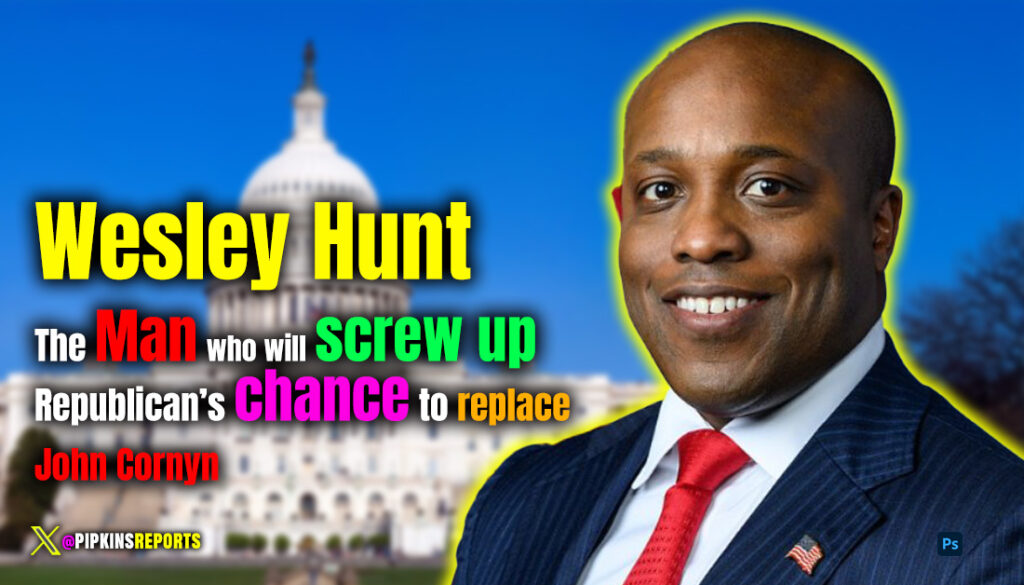Rep. Wesley Hunt’s entry into the 2026 Republican primary for U.S. Senate in Texas introduces a new contender to an already contentious field, potentially dividing the anti-establishment vote and bolstering Sen. John Cornyn’s position despite widespread base frustration with the incumbent.
Hunt, a second-term congressman from Houston’s suburbs, announced his candidacy on Monday, positioning himself as a Trump-aligned conservative ready to take on Cornyn and state Attorney General Ken Paxton.
The move comes after months of speculation and despite pleas from national GOP leaders, including the National Republican Senatorial Committee, to stay in his safe House seat and avoid fracturing the party.
Paxton entered the race in April, framing it as a direct challenge to Cornyn’s leadership within the Senate GOP and instantly became a favorite of the Conservative (anti RINO) wing of the party.
Hunt’s decision adds complexity to a primary that has pitted the party’s populist wing against its institutional core. Conservatives have long criticized Cornyn for his close ties to Mitch McConnell and perceived reluctance to fully embrace former President Trump’s agenda. Paxton, with his record of battling federal overreach on issues like election integrity and border security, has emerged as the base’s preferred alternative. Yet Hunt—himself a vocal Trump supporter—could siphon votes from Paxton, creating a scenario where Cornyn advances on a plurality.
This dynamic raises questions about the race’s origins. While Hunt has cited personal motivations, including family priorities and a desire to address national challenges like the border crisis, his ties to Texas’s GOP establishment merit scrutiny. In 2020, as a candidate in the district once represented by George H.W. Bush, Hunt publicly honored the former president’s birthday on Facebook, praising Bush’s journey “from the Halls of Congress to the Oval Office.“
That district, TX-07, remains a touchstone for the Bush network’s influence in Houston politics, where establishment figures have historically shaped Republican primaries.
Further connections link Hunt to Cornyn directly. The two co-sponsored the Project Safe Childhood Act in April 2023, a bipartisan measure aimed at combating child exploitation—a rare point of collaboration amid broader GOP tensions.
Such alliances, while policy-driven, underscore Hunt’s navigation of both populist and institutional lanes. In a state where Bush-era influencers—consultants, donors, and operatives—still wield significant sway, it’s not implausible that surrogates from this network quietly encouraged Hunt’s bid. Reports indicate Cornyn’s reelection team has been aggressive in defining the field, including efforts to highlight Paxton’s legal vulnerabilities.
A divided primary would align with that strategy, allowing Cornyn to conserve resources while opponents expend energy on each other.
Hunt brings strengths to the race: his military background as a West Point graduate and Army veteran, his appeal as a Black conservative in a diversifying party, and his record of viral advocacy on conservative issues.
He has positioned himself as a bridge between Trump’s base and broader GOP coalitions. But his candidacy is not without vulnerabilities that could blunt his momentum.
Foremost among them is an ethics probe from June 2024, when the Office of Congressional Ethics referred Hunt to the House Ethics Committee for potentially misusing campaign funds on private club memberships totaling over $74,000. The expenditures included dues to a Houston social club and a shooting range, which investigators questioned as personal rather than campaign-related.
Though cleared in December 2024 due to ambiguities in federal rules, the episode fueled accusations of fiscal laxity—ironic for a candidate who campaigns on reining in government spending.
On that front, Hunt has drawn fire from fiscal hawks for supporting multiple continuing resolutions that raised the debt ceiling since entering Congress in 2023. Detractors, including online conservative commentators, have labeled him a “RINO” for these votes, arguing they contradict his pledges to cut waste and align with Trump’s economic vision. His attendance record has also come under scrutiny, with recent reports noting an uptick in missed roll calls as he weighed a Senate run.
Foreign policy stances add another layer. Hunt’s strong support for Israel, including sponsorship of bills like the Antisemitism Awareness Act backed by the American Israel Public Affairs Committee, has earned him plaudits from pro-Israel donors but criticism from those who view it as prioritizing foreign lobbies over domestic concerns.
In Texas, with its sizable Arab-American community, this could prove a liability.
As the primary unfolds—filing deadline in December, early voting in March—polling will clarify the splits. Early indicators suggest Paxton leads among hardline conservatives, but Hunt’s entry could narrow that gap by 20-30 points, per anecdotal assessments from GOP insiders. A fragmented field risks handing Cornyn a narrow victory, much like past Texas primaries where vote division favored incumbents.
For constitutional conservatives seeking a Senate voice uncompromised by Washington habits, this race tests the party’s resolve. Paxton’s prosecutorial edge offers a clear path to reform; Hunt’s polish might dilute it. Whether this is organic ambition or orchestrated disruption, the outcome will shape Texas’s role in a GOP Senate majority—and the broader fight to restore limited government.
* Correction. We removed reference to Mitch McConnell as Minority Leader.
